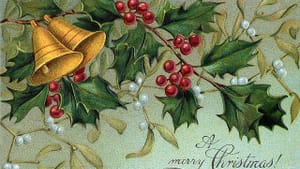Stay in the Loop
BSR publishes on a weekly schedule, with an email newsletter every Wednesday and Thursday morning. There’s no paywall, and subscribing is always free.
Happy holidays!

This time of year, when the world is blanketed in snowy innocence and we are once again drawn to glittering treasures displayed in windows nearly the world over, much of what the season means is cast to the wayside or totally forgotten. I am not speaking hear of the birth of Christ, for this article is not about him, but rather, the true meanings and origins of our festivities and sparkling decorations.
An ancient pagan custom, European in origin, called for the gathering of fir boughs near the solstice. This was to remind the folk that, at the darkest part of the year, life goes on and that spring will come again, renewing the land and kissing it with verdancy. The evergreen decorations were proof that the world had not come to an end but was merely asleep.
Whole trees were never cut down in those early times; the practice of an actual tree in one’s home came about much later on, in the 1600s. Holly was also used, both because it’s an evergreen plant but also, probably, because the Druids considered it a potent symbol of protection. Mistletoe was another plant with deep spiritual connections to the Druids. It was often hung in the house to ward against evil spirits and to bring good luck to those who lived there. It was also a symbol of love and friendship, hence the tradition of sharing a kiss beneath the mistletoe.
Note that the early Christian church forbade these decorations but now embraces them as a part of its own mythos, going so far as to even place a star (in honor of the one that led the Wise Men and others to where the baby Jesus lay in a manger) atop the highest bough.
A threefold celebration
I split the holiday into the three parts to reflect the different aspects of my being. I celebrate Yule as a spiritual observance. Solstice plays a great part in my Yule celebration, as we push back the darkness on the longest night of the year.
I celebrate Yule as a spiritual observance. Solstice plays a great part in my Yule celebration, as we push back the darkness on the longest night of the year.
Christmas calls to my heart and memory; it holds a special place therein because I was brought up in a household that celebrated all things Christmas, from dazzling lights to glittering tinsel that would find its way into my cat’s maw or end up twisted around the brush of the vacuum cleaner for months after. We sang carols, had ever-full cups of good cheer, and were closer, as a family, than any other time of year; not because we felt we had to be, but because the magic of Christmas made it possible. I was allowed to  believe in Santa past a time when most of my childhood chums already knew where their presents came from.
believe in Santa past a time when most of my childhood chums already knew where their presents came from.
My mother hated it when my brothers would refer to it as “Xmas,” but Xmas (sorry, Mom) is the third part of my holiday trifecta. To me, Xmas has always been separate from both the Christian Christmas and the pagan Yule. Xmas is for the material. It is about giving and getting. It is a time when we wait with bated breath to see what is inside all those boxes. We long to tear into the pretty paper, shred those carefully tied ribbons, and wallow in what might be. At no other time of year do we plunge so deeply into the mire of debt to try to give the perfect gift. Xmas may include love and family, but it's not really about those things; at Xmas, a.jpg) varice is King.
varice is King.
“Season’s greetings”
Many — well, mostly my staunchly Christian friends — get angry this time of the year because we don't say “Merry Christmas” anymore. There are cries of “Put Christ back in Christmas!” all over my social media. These folks seem to forget that there are other holidays at this time of year, from Kwanzaa to Yule to Chanukah, the latter two of course being much older than the celebration of Christmas. (Kwanzaa is the baby, having been nominally created — really sort of given more of an upgrade from a simple harvest festival — by Maulana Karenga in 1966.)
I would never say that anyone's beliefs are right or wrong, and I find great beauty within all these holidays, which stress brotherhood and celebration, peace and goodwill toward humankind. This is one of the main reasons I embrace Xmas, for gifts are something we can all get behind. I tend to return the greeting of anyone who wishes me well at this time of year. If I am offered a hail and hearty “Happy Yule,” I will reply in kind. “Happy Chanukah!” or “Happy Kwanzaa!” will also find me answering these with reciprocity.
This time of year is for everyone, for goodwill and peace. Harmony and love are concepts we all embrace, so keep that in mind the next time you are wished a “Happy Holidays!” No scorn on your particular celebration was intended; it is merely an all-encompassing wish for your happiness, and who couldn't use more of that?
Photos, top to bottom: Sunrise between the stones at Stonehenge on the Winter Solstice in 1985 (photo by Mark Grant via Creative Commons/Wikimedia); a ’50s Christmas (Photo by judylcrook via Creative Commons/Flickr); presents (photo by James Petts via Creative Commons/Wikimedia).
Sign up for our newsletter
All of the week's new articles, all in one place. Sign up for the free weekly BSR newsletters, and don't miss a conversation.

 Chris Predmore
Chris Predmore